'It Feels Like a Prolific Time': Aaron Dessner on The National's 'Laugh Track'
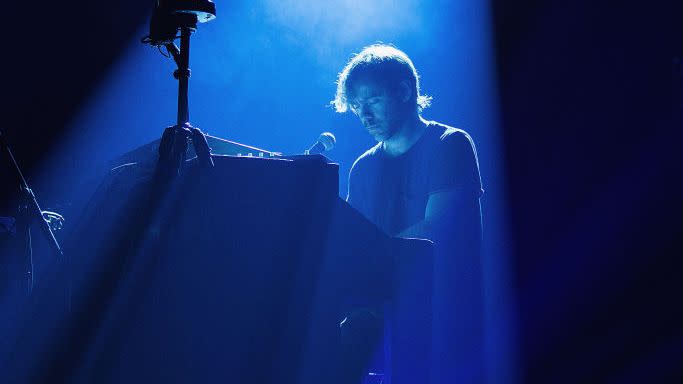
In April, when The National released their ninth studio album, Last Two Pages of Frankenstein, it seemed like there might be more to the story. In interviews, various members of the enduring indie-rock band mentioned having an abundance of material to choose from. Plus, there was the case of the mystery single “Weird Goodbyes,” which was released the previous summer—but left off Frankenstein, confounding fans and critics. Turns out, “Weird Goodbyes” was meant for an entirely different album.
Laugh Track, out today, is the surprise sister album to Last Two Pages of Frankenstein. As its playful title indicates, Laugh Track is much less melancholy than its twin. Most of the songs were written during the same time period as Frankenstein, but recorded separately, after the band refined them during soundchecks on their most recent tour. The result is a sprawling and cathartic record—a return to the intricate, yet anthemic rock 'n' roll that helped The National carve a unique lane for themselves within the crowded indie-rock scene of the early aughts.
“This album feels like the end of something and the beginning of something,” band member Aaron Dessner tells me from his dressing room at The McKittrick Hotel in Manhattan, where he just finished an acoustic VIP performance with the young pop artist Gracie Abrams.
“It just feels like a prolific time in the band, and that's attributable to all the other things we've been independently doing and learning,” he adds. For Dessner in particular, it’s been a surreal few years, full of transformative experiences. In addition to performing a VIP show for 100 screaming fangirls, he's also embarked on a string of high-profile collaborations with pop artists such as Abrams, Ed Sheeran, and, of course, Taylor Swift.
In fact, Dessner credits his and The National’s work with Swift for giving them the confidence and freedom to silence the inner critic that can sometimes bring an album’s creation to a halt. While letting go was no small task for a tinkering perfectionist like Dessner, the leap of faith helped land the band in one of its most fruitful stretches since they first formed in 1999. It’s the kind of experience a group that is more than two decades into its career would kill to have and cannot consciously cultivate. “It’s like lightning,” Dessner says.
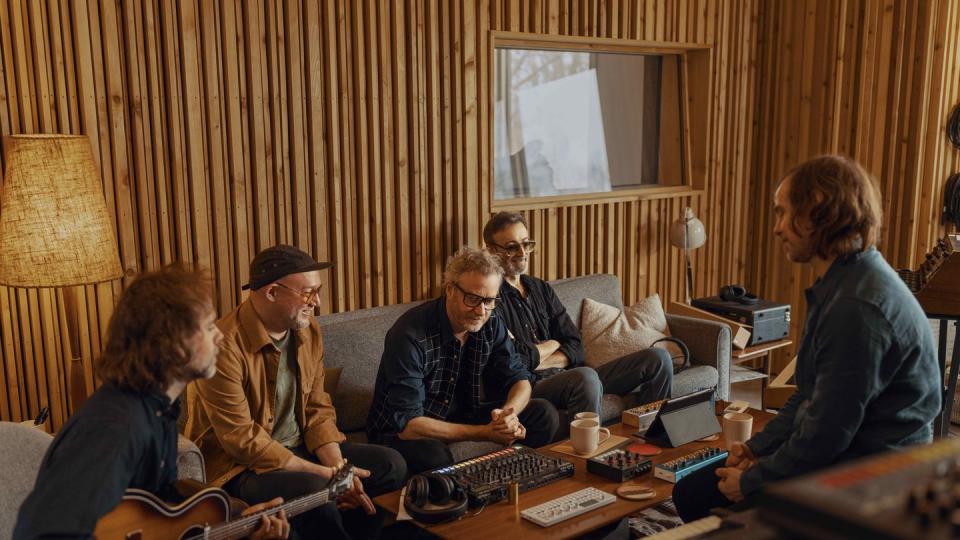
ESQUIRE: This is a much looser, happier-sounding album. What do you attribute that to?
AARON DESSNER: Letting go of notions of how to make songs and allowing for some loose, unstructured approaches to come into it. Also, some songs literally came from just improvising on stage during soundcheck. Maybe it's having come through a really hard time and nearly not surviving as a band. We came back together and we felt healthy.
What do you think gave you the license to let go?
There's something about The National. The spark in the band hasn't faded. There’s been times where we've run on fumes, but whatever that alchemy is that causes us to make music that we love is still there. At some point, this realization collectively came where we were like, We can just let go a little. A lot of that's on me, because I would often steer a lot of the recording process. This record is less about that. The songs are more off the cuff, more collaborative. It just feels like a prolific time in the band. And I think that's attributable to all the other things we've been independently doing and learning.
You guys have had a crazy few years. Are there any influences on Laugh Track from those other experiences?
All the other work that I've done as a producer and a songwriter has come back in the form of confidence and experience in the studio. That's the same for the others, too. Everybody's done a lot of work. Matt's made solo records. You become quicker with ideas. It gets easier over time because your mental faculty and acumen sharpens. I learned such a huge amount from Taylor, specifically. The main thing I learned is just to keep moving and to have confidence and maybe to not think so hard, to just be productive without criticism, and put out more music.
When and where did the idea for this second companion album come from?
The truth is we had more than 30 really good songs going into First Two Pages of Frankenstein. Last year we were on tour in London, and I said, “It really needs to be two albums, because how can we possibly choose?
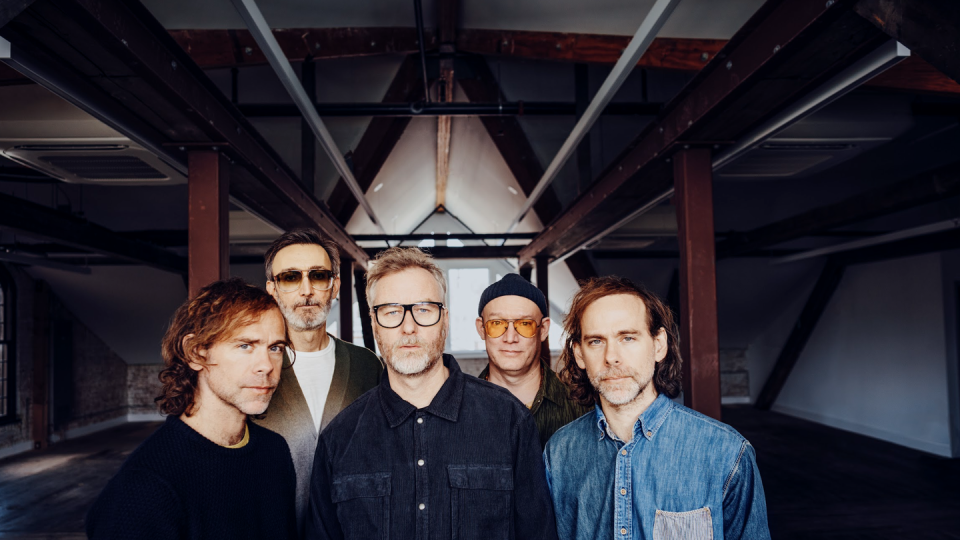
How did you guys decide which songs to put on Frankenstein and which to save for Laugh Track?
Matt had a vision of a narrative for First Two Pages of Frankenstein in terms of the struggle that you feel in the characters, in the songs. At the end there's this ray of light on “Send for Me.” My brother and I had other ideas about what we thought the first record could have been, but we all really loved what was chosen and how that felt.
What's your favorite song on the new album?
Good question. Maybe “Space Invader.” The arc of it is really crazy and cathartic. It explodes into this intense outro that just grows and grows. It’s like a runaway train. You hear elements of why we love the Grateful Dead but also why we love Krautrock. It’s this weird blend of things. Maybe after 24 years into the band, we're suddenly finding a way to synthesize all these influences that we have. It might become a song that we close with.
It has a similar catharsis to your early rock songs, like "Mr. November."
That’s exciting. You can't contrive good rock songs, they just have to appear somehow. What I'm thankful for is just at this point that there are still creative gears turning and that we have come out of a difficult time with a lot of new energy. It's hard with any band to keep the spark alive. But somehow it has stayed.
Do you feel really famous now?
I don't think it's important. The only thing I feel is that I've become much more recognizable to people in the general public because of being on stage with Taylor. It's not my personality to be drawn to that.
It doesn't seem like it, which is why I’m curious about your experience. Is it surreal?
It is surreal. You’ll be in odd places, like, filling up the gas, and somebody there will know the songs you made. It can be a little concerning at times, but I'm just grateful to be able to do what I do. Sometimes I need to turn it off and literally kick a soccer ball. I have mixed feelings about that cage because you become a caricature of yourself. You're a character in your own drama. I'm overthinking it right now.
You’ve recently worked with a lot of young women and up-and-coming stars, like Girl in Red and Gracie Abrams. Do you feel a unique responsibility to be a good steward of the studio experience for them?
Definitely. It's important to listen and to learn from them as much as I impart on them. Even though I have a way of playing instruments, I prefer to embrace what they bring in harmonically and in terms of their writing. That has been the biggest joy for me. You become really close with people that you work with in music, even if they're maybe not your closest friends. There's something really intimate and vulnerable about the experience, because you're both out on a limb. For whatever reason, the environment at Long Pond Studios has felt quite natural and safe. People open up there, and I hope that I do a good job.
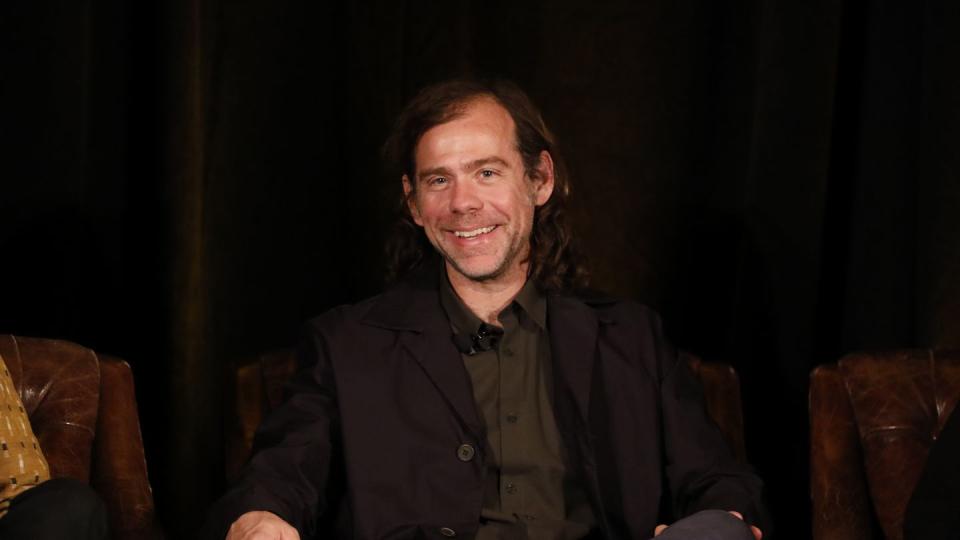
You think it’s the location of your studio? Maybe you're a sensitive guy.
Maybe. I don't like to say it. I really can't imagine having anything but the utmost respect for people that are there making stuff with me. Whenever I hear about situations where people haven't been respected or given a comfortable environment to make stuff, I can't understand it—because to me, that's everything.
I feel the same way when I share music with any songwriter that I'm working with. I feel vulnerable doing it because they might not like it, or they might want something entirely different. No matter what I've done in the past and no matter who it is, it's the same feeling of vulnerability.
You once said Scott was probably the nicest member of The National. I'm curious what your superlative would be. Scott's the nicest. What is Aaron?
Good question. I'd be the most irreverent. But also, if someone's going to lose their passport, it's me. But then I make the setlist, so nothing really makes sense. I can be incredibly driven and help lead, but at the same time, I'm definitely the disorganized one. It's a weird collision of things.
I’ve heard you describe your experience working with Taylor Swift as prolific. You use that word a lot. What do you think made it so prolific? What do you scratch y'all's chemistry up to?
Taylor is such a brilliant storyteller and a masterful songwriter. When she encountered that generative engine that I have where I make a lot of music that just has feelings and images within it—it was like giving her a canvas that she could then give so much substance to. She has a rare gift to conjure these brilliant, narrative, lustful songs. The chemistry was just instantaneous. It was like a wildfire.
One of the things that makes her so exceptional is all the different ways that she makes songs. She can make this elaborate, intricate song like "Tolerate It" with me, but then she can, with a different hat, make a perfect pop song. She's incredibly versatile.
Do you think you can make a perfect pop song? Are you going to be on Reputation (Taylor's Version)?
I’ve recently started to make stuff that's really different from anything. Gracie and I have started to make new songs and sort of intentionally making different kinds of songs than the ones we've done before. You realize that when you have that intentionality, you can radically change clothes. And it's actually really fun, too. People associate me with a certain meditative or intricate quality. But it’s been fun to realize that things I do can actually shapeshift. It's fun and I do enjoy the challenge. I would love to write a perfect pop song.
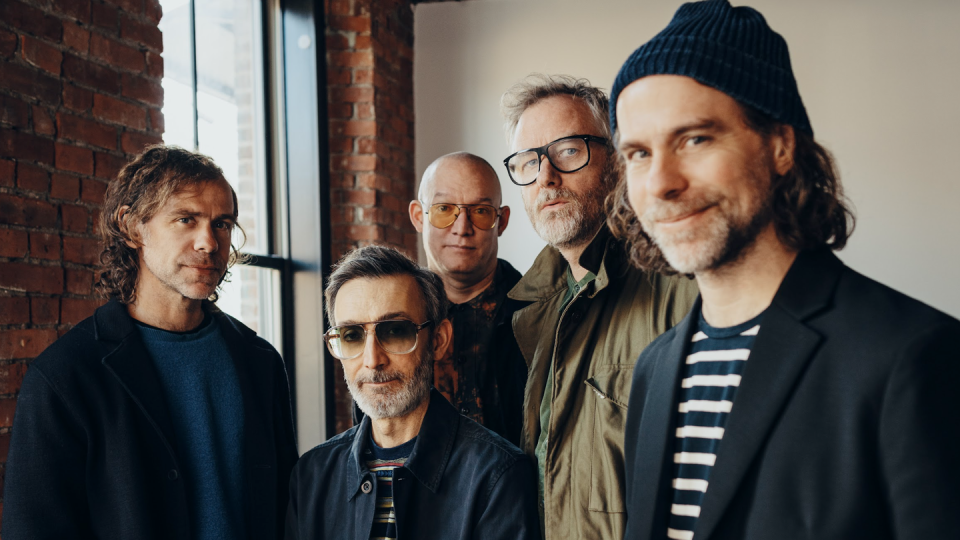
Has your relationship with Taylor Swift and your larger profile in pop culture caused any tension within the band?
We've never been the type of band that's in love with our own shadow and that extends to whatever's happened to me. There are things about it that have been strange. You're much more recognizable. Obviously, I've made music now that is listened to on a much wider scale than what we had known. But Bryan was orchestrating a lot of those songs. The band appeared on "Coney Island" from Evermore and Taylor joined us for "The Alcott." It all felt quite natural—just artists exchanging and collaborating. But it's a moment in time for sure. I still feel like the chemistry of the band is sacred ground, and we all feel that The National is in a healthier place today than maybe it's ever been in terms of our interpersonal dynamic.
It’s been pretty interesting to witness The National’s creative partnership with Swift become a part of the pop-culture discourse. I wonder if it’s elevating younger fans’ interest in music, specifically in the artistry and mechanics of how music is made.
We notice a lot of younger people in our audiences now. We played Madison Square Garden the other night, and you could see people that are much younger and clearly know about us from Evermore. That's always been the thing that I loved about music—how it seemed like there were all these interconnections. Like Jerry Garcia was playing on everybody's records in the late ‘60s and early ‘70s. Or Joni Mitchell playing with Pat Metheney. My favorite thing about music was community. It was why Bryce and I did Dark Was the Night. Maybe it's because we were these Ohio guys living in Brooklyn who weren't part of the “scene.” We were never going to be the White Stripes, you know? But we hoped to create was community and lasting relationships that give meaning to this weird life that we're in.
When it comes to Taylor, there's no one at her level. I don't know that there ever will be, but underneath it all is just a really talented, hardworking, incredible musician, so she clicks with all kinds of different artists. The way the walls are coming down between different genres and different levels of where people are in the landscape of music is really interesting. You end up collaborating with people in different scenes. Even things I'm doing now that I can't discuss, but it's really interesting to me.
You've left me hanging. What are you working on? Tell us!
I know! Sometimes, you can't talk about what you're working on because it’s the artist’s story to tell, but it’s really fun.
Who is your dream collaborator?
I think about the early days of U2, up until Joshua Tree, or even Atchung Baby. That would be fun to make. I probably spent most of my time listening to Dylan, but that's such an unlikely thing to have happened that I don't really wish for it.
I don't know. Stranger things have happened.
To be honest, if I never did anything other than continue to make songs with The National and songs with Justin Vernon, with my brother, and other friends, I’d be happy. I’m quite content.
You Might Also Like


